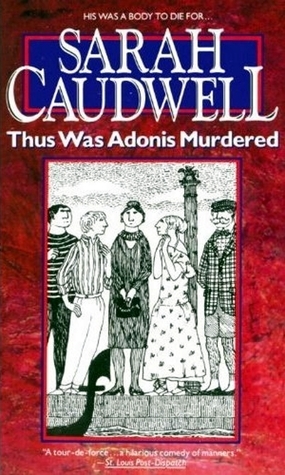Thus Was Adonis Murdered by Sarah Caudwell: A review
I've made it a practice in recent years to write reviews of all the books that I read and post them on Goodreads and here on my blog. It's a way of firmly impressing the book into my memory and I get quite a bit of enjoyment out of doing it and of reading your comments when they come.
So, I sat down to do my review of Sarah Caudwell's Thus Was Adonis Murdered and found that my memory of the book, which I finished more than a week ago, was blank. Was that a fault of the book or of my memory? Both, perhaps? I saw that I had given the book a two-star rating which I very rarely do, so obviously it had not made a great impression on me. Still...
In the end, I resorted to reading the synopsis and some of the reviews on Goodreads to jog my memory. Here, then, are my (restored) impressions of the book.
The book is set in Venice and in England and the main characters are a young barrister named Julia Larwood and Professor Hilary Tamar, an esteemed Oxford don.
Julia had saved her money to take a trip to Venice as part of a tour group. The whole thing turns into a nightmare when a member of the group is murdered and Julia is accused of the murder. The book consists of Julia's letters home to Hilary and the group of barristers in her practice who take the information that she provides and analyze the clues in order to identify the real culprit.
That, in a nutshell, is the plot of the book.
This was the first in a series of four books that featured Professor Hilary Tamar. As such, it was not a bad introduction to the character. Caudwell did a good job, I thought, of developing the personality of Tamar. He comes across as one who enjoys gossip and good food and drink, preferably in a trifecta combination. He would be an entertaining dinner companion. I think I might enjoy spending more time with him.


I very often forget the plot of books soon after reading them. And have to read the synopsis of those books to refresh my memory. I think this is common for those of us who read many books in a short period of time. Then of course, there are those rarer times when we can't forget the plots.
ReplyDeleteYour comment is a great comfort to me! So, I'm not the only one this happens to.
DeleteA while ago I embarked on a rereading of several Margaret Atwood books. In general I remembered them, but there were nevertheless many details that I forgot, and I was happy to read them again, without a feeling of dejá vu. I think it’s like a familiar landscape; you know it well, but there are always bits you have missed or forgotten and to discover them is very rewarding.
ReplyDeleteIt's never good when you can't remember a book you just finished reading. It sadly happens to me more often than I'd like. And when it does happen, I like to blame the mediocre-ness of the book rather than my tired brain. ;D
ReplyDeleteI can easily see why you forgot a book that you rated only two-stars. Completely forgettable!
ReplyDeleteYeah, it wasn't a TERRIBLE book. There were things about it that I enjoyed. It just didn't ring many chimes for me.
DeleteSounds like your subconscious was helping you at least when it came to rating the book, if not so much with the review itself. I've had that happen every so often, but never with I book I felt good about in the longer term. Sorry you had to re-research the book plot to get a feel for what you'd read because it sounds like more work and time than this one probably deserved from you. Just wasn't "for" you, I suppose.
ReplyDeleteBut then something that wasn't "for" me has been greatly enjoyed by many readers. To each his/her own.
DeleteHilary might not be a man, the name is used by women too. These Caudwell books are known for the fact that Gamer's gender is never revealed!
ReplyDeleteYou can view the character as either sex, I suppose, but for me he is smug and self-confident as only British men of the period are generally depicted; thus, for me, he will always be male.
Delete